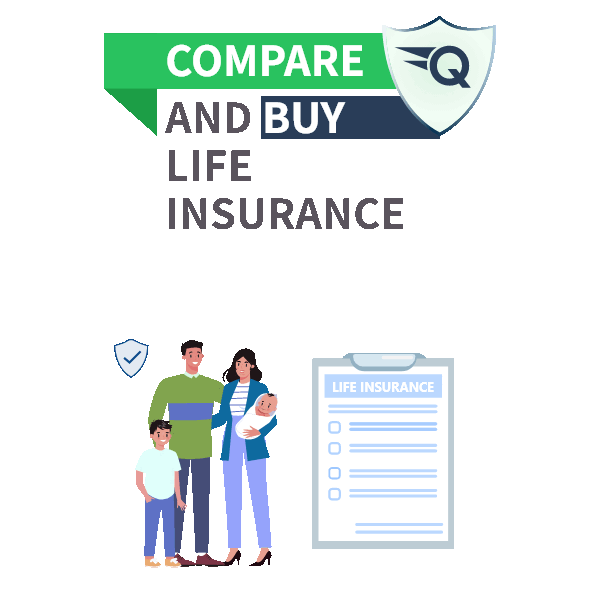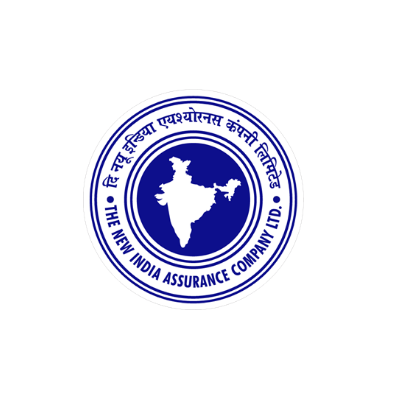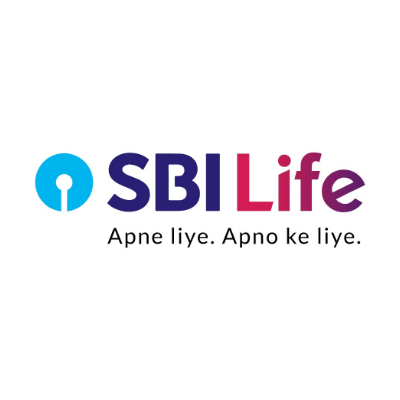LIFE INSURANCE
Buy life insurance to take care of your family’s future. Choose the best plan to protect your life. Invest your payments in regular amounts of money (premiums), and in return, the insurance company promises to give money to your loved ones in supportive terms if something happens to you. Life insurance plan ensures your family is financially protected if the unpredictable happens.
What Is Life Insurance

Types of Life Insurance Policies
 Term Plan
Term Plan
Term life insurance is for a specific period. It pays a death benefit to the nominee if the insured dies during the term. It’s a pure protection for life and life saving insurance plan.
 Endowment Plan
Endowment Plan
Endowment life insurance plans allow you to pay premiums for a set period (e.g., 15 or 20 years). At the end of this period, you receive the sum assured plus bonuses. If in case you die, then the nominee receives this amount.
 Child Plan
Child Plan
Combine insurance and investment to secure your child's future. Child plan life insurance policy provides a lump sum at the end of the term and payouts at key educational milestones.
 ULIP Plan
ULIP Plan
An ULIP plan is a market-linked plan with investment options ranging from low-risk bonds to high-risk growth funds. It has a 5-year lock-in period, after which partial or full withdrawals are allowed without charges.
 Pension Plan
Pension Plan
Pension plan of life insurance provides regular income after retirement, helping to maintain a comfortable lifestyle when regular income stops.
 Group Term Insurance
Group Term Insurance
Covers a group of people under a single policy. The purpose of GTL is to provide financial security to the beneficiaries of the insured in the event of their death.
Best Life Insurance Policy Benefits and Features
Life insurance provides financial security to your family by paying a lump sum amount in case of your untimely demise.
The primary benefit of life insurance is the death benefit, life insurance coverage for death ensures that your family or your beneficiaries will receive a specified amount of money upon your death.
Certain life insurance policies also provide maturity benefits, where you receive a lump sum amount if you survive the policy term.
A few types of life insurance policies offer guaranteed returns on the premiums paid, ensuring stable growth of your investments.
Life insurance can be used as a tool for long-term wealth creation and financial planning, helping you achieve financial goals such as buying a house or funding your child's education.
Premiums paid towards life insurance policies are eligible for tax deductions under the Income Tax Act, providing additional savings.
Additional benefits for riders life insurance, riders can add coverage on their base life insurance policy to enhance life insurance coverage benefits, such as critical illness cover or accidental death benefit.
Life insurance policies offer flexible premium payment options, allowing you to choose payment frequencies (monthly, quarterly, annually) based on your financial convenience.
Certain life insurance plans, such as pension plans, are specifically designed to help you build a corpus for retirement, ensuring a steady income post-retirement.
Few life insurance companies in India allow you to take loans against the policy's cash value, providing liquidity during emergencies while keeping your insurance coverage intact.
Who Needs a Life Insurance Policy?
- Individuals with dependents
- Primary breadwinners
- Parents to secure family’s future
- Homeowners with debt
- Business owners
- Single parents
- Debtors
- Those involved in estate planning
- Individuals planning for retirement
- High-income earners
- Anyone concerned about financial security
- You!
Types of Term Insurance Plans
1. Level/Standard Term Plan
The sum assured remains constant throughout the policy term, with premiums typically lower for younger policyholders.
2. Increasing Term Insurance
The sum assured increases annually by a fixed amount. Upon death, the sum assured for that year is paid out.
3. Decreasing Term Insurance
The sum assured decreases annually, often used for loan redemption where the payout matches the reducing loan balance.
4. Return of Premium Term Insurance (TROP)
Offers a maturity benefit in addition to death benefit. If the insured survives the policy term, all premiums paid are refunded; if not, the sum assured is paid to the nominee.
How Does Life Insurance Policy Work?

1. Buy Life Insurance: You purchase a life insurance policy from an insurance company to protect your loved ones financially in case something happens to you.

2. Pay Premium Payments: You make regular premium payments to the insurance company as agreed upon in the policy terms. This ensures that your policy remains active and provides coverage..

3. Enjoy Coverage: While the policy is active, you enjoy the peace of mind knowing that your family is financially protected against unforeseen events.
How To Receive Life Insurance Term Benefits:
1.On Survival
If you outlive the policy term, you may receive maturity benefits. This could be a lump sum payment or periodic payouts depending on the type of policy.
2.On Death
If you pass away during the policy term, the insurance company pays a death benefit to your chosen nominee or beneficiary.
Important Terms About Life Insurance Benefits
The individual who owns the life insurance policy and pays the premiums to the insurance company.
The person whose life is insured under the term insurance policy. This benefit is typically the same as the policyholder but can be someone else.
The person designated by the policyholder to receive the death benefit in the event of the life assured's death.
The duration for which the insurance policy provides coverage, specified at the time of purchase.
Regular payments made by the policyholder to maintain the policy and keep it in force.
Additional benefits that can be added to the base policy to customize coverage, such as critical illness or accidental death riders.
The amount payable to the policyholder if they survive the policy term, usually in the form of a lump sum or periodic payments.
The sum assured is paid to the nominee/beneficiary upon the death of the life assured during the policy term, providing financial support to the family.
Term Insurance Riders Add-on Benefits
Covers specific critical illnesses; pays a lump sum if diagnosed with any covered illness.
Provides an additional sum assured to the beneficiary if the insured dies due to an accident.
Keeps the policy active if the insured becomes unable to pay premiums due to disability or income loss; future premiums are waived off.
Pays the sum assured upon diagnosis of any terminal illness, supporting financial needs during illness.
Optional rider that refunds all or part of the premiums paid if you outlive the policy term.
Understanding Factors Affecting Term Insurance Premiums
The older you are, higher will be your premium due to increased mortality rates.
Women generally have lower premiums than men due to longer life expectancy.
Riskier professions result in higher premiums compared to desk jobs.
Longer terms mean higher premiums, while shorter terms are more affordable.
Healthy habits lead to lower premiums; habits like smoking increase costs.
History of illnesses in the family may increase your premium.
Higher risk areas (e.g., seismic zones) may lead to higher premiums.
Extra benefits like critical illness coverage increase premiums.
Why is Life Insurance Important At Every Stage Of Life
1. Life Insurance for Young Adults (Age between 20s-30s)
- Protect against student loans and early career debts.
- Ensure spouse and future children are financially secure.
- Start building wealth and securing assets for the future.
2. Life Insurance for Middle-Aged Adults (Age between 40s-50s)
- Cover mortgage, children's education, and elderly care.
- Replace lost income and maintain standard of living for dependents.
- Prepare for potential medical costs and critical illnesses.
3. Life Insurance for Pre-Retirement (50s-60s)
- Pay off remaining loans and mortgages.
- Build retirement savings and ensure financial independence.
- Cover medical expenses and ensure care during retirement.
4. Life Insurance for Retirement (60s and beyond)
- Provide inheritance and financial support for heirs.
- Protect assets and ensure smooth transfer to beneficiaries.
- Cover funeral costs and other end-of-life expenses.
Life insurance adapts to different life stages, offering essential financial protection and ensuring a stable financial future for you and your loved ones.
Who Should Consider Buying Life Insurance?
- Working Individuals
- Married Couples
- People with Kids
- Housewives
- NRIs
- Retirees
- Business Owners
Determining Your Family's Life Insurance Needs
- Family’s NeedsAssessing financial obligations and future expenses.
- HLV CalculationsCalculating Human Life Value based on income and expenses.
- Income ReplacementProviding ongoing income to replace lost earnings.
- Existing Loans and DebtsEnsuring debts are covered to prevent financial strain.
- Medical EmergenciesCovering unexpected medical expenses and treatments.
- Life Stage ChangesAdjusting coverage based on changing life circumstances.
Reasons For Needing Life Insurance
- Protecting loved ones from financial hardships.
- Coverage for medical expenses in case of severe illnesses.
- Ensuring affordable financial protection for the long term.
- Building reserves for unexpected financial crises.
- Instilling financial discipline and savings habits.
- Building a fund for significant life milestones.
- Ensuring a comfortable retirement without financial worries.
- Availing tax deductions and exemptions on premiums paid.
Factors That Affect Life Insurance Premiums
 Sum Assured
Sum Assured
Higher the coverage amount leads to a higher premium.
 Your Age
Your Age
Younger individuals typically pay lower premiums.
 Your Gender
Your Gender
Women generally pay lower premiums due to longer life expectancy.
 Medical History
Medical History
Pre-existing conditions can increase premiums.
 Lifestyle Habits
Lifestyle Habits
Smoking, drinking, and other risky habits raise premiums.
 Your Occupation
Your Occupation
Riskier jobs lead to higher premiums.
What are The Payout Options Available In Life Insurance Income Plan?
- Lump Sum PayoutIt's a one-time payment of the full sum assured.
- Monthly Income PayoutIt’s a regular monthly payment to the beneficiary.
- Lump Sum + Monthly IncomeA merger of a lump sum and monthly payments.
- Increasing Monthly IncomeA monthly payment that increases over time.
How to Claim Life Insurance Plans In India?
- Inform the insurer about the death of the policyholder as soon as possible and overall details if any.
- Provide necessary documents like the death certificate, policy documents, and claim form.
- The insurance company verifies the claim and processes it.
- Once approved, the payout is made to the nominee or beneficiary.
Types of Deaths Not Covered In Life Insurance?
- SuicideIt's a one-time payment of the full sum assured.
- Death due to Self-Inflicted InjuriesSerious injury that causes self-harm leading to death.
- Death due to Hazardous ActivitiesDeaths from dangerous activities like skydiving, without disclosure.
- Death due to Criminal ActivitiesDeath occurring while participating in illegal acts.
- Death under the InfluenceDeath caused by drug or alcohol abuse.
- War and Civil CommotionDeaths resulting from war or civil disturbances.
List Of Required Documents For The Life Insurance Claim Settlement Process
- Original policy bond
- Copy of the death certificate, self-attested by the nominee
- Photo identity proof
- Residential proof
- Copy of the nominee's bank passbook along with a canceled cheque
- Copy of FIR, if applicable
- Report from concerned legal authorities, if applicable
- Evidence of post-mortem report in case of non-accidental death
- Report on the medical and legal cause of death
- Medical reports and certificate issued by the attending physician
- Hospital bills and discharge certificate
Why People Lose Money In Life Insurance
Have you ever felt like you're losing money on your life insurance policy? It's important to know why this happens and what you can do to prevent it.
Here are some common reasons people lose money on life insurance:
- Canceling your Life Insurance Policy EarlyStopping your policy early can mean losing the premiums you've paid, as there are often penalties.
- High CostsChoosing a policy with premiums that are too high for your budget can lead to missed payments and the policy ending.
- Not Understanding the PolicyNot fully understanding the terms and conditions can lead to unexpected costs or denied claims.
- Inadequate CoverageGetting too little coverage can leave your family without enough support and make you feel like the policy was a waste.
- Ignoring Health UpdatesNot updating your policy to reflect changes in your health can affect your benefits and claims.
Stop Before You Cancel Your Life Insurance
Before deciding to stop your life insurance policy, consider these steps which will help to void you to lose the Life Insurance policy money:
- Review Your PolicyUnderstand the terms, benefits, and any penalties for canceling early.
- Compare AlternativesLook at other policies and insurers to see if there's a better option for you.
- Reassess Your NeedsThink about your current financial situation and future needs to see if you still need coverage.
- Get Professional AdviceTalk to a financial advisor or insurance expert to understand the best course of action for your situation.
- Know the RulesBe aware of the specific rules and conditions of your policy, including any penalties or loss of benefits if you cancel.
Avoiding Mistakes Before Buying And Comparing Life Insurance And Term Insurance Involves These Steps:
- Figure out how much coverage you actually need based on your family's financial situation and future plans.
- Understand the difference between life insurance (covers you for your entire life) and term insurance (covers you for a specific period).
- Look beyond just the price—compare what each policy covers, including any extra benefits like coverage for critical illnesses.
- Always read the policy terms carefully to understand what's covered and what's not, including any fine print.
- Pick a company with a good reputation for paying claims promptly and treating customers well.
- Provide accurate information about your health and lifestyle to avoid problems with claims later.
- Think about adding extra protections, like coverage for accidents or illnesses, if they fit your needs.
- If you're unsure, talk to a financial advisor or insurance agent to help you understand your options better.
- Periodically check if your insurance still meets your needs, especially when big life changes happen, like getting married or having kids.
Why People Lose Money When Canceling Life Insurance Early
People lose their life insurance policy money when they surrender or cancel their life insurance policies prematurely for several reasons:
- Surrender ChargesMost life insurance policies, especially whole life and universal life, have surrender charges if you cancel the policy within the first few years. These charges can approximately cut down the amount you get returned.
- Loss of Premiums PaidWhen you cancel a policy, you often forfeit the premiums you've already paid, especially if the policy is terminated early in its term.
- Reduced Cash ValueThe cash value of permanent life insurance policies (like whole life) takes time to build. Early cancellation means you might get back only a small portion of the cash value.
- Administrative FeesSome policies have administrative or cancellation fees that further reduce the payout you receive upon surrender.
- Missed Out on Potential DividendsSome life insurance policies pay dividends. By canceling early, you miss out on future dividends that could have been received over the life of the policy.
- Loss of Death BenefitCanceling your policy means your beneficiaries will no longer receive the death benefit, which was a key reason for taking out the policy in the first place.
- Tax ImplicationsIn some cases, the money you receive upon surrendering a policy can be taxable, especially if the payout is more than the total premiums paid.
- Impact on Financial PlanningCanceling a life insurance policy can disrupt your long-term financial planning. The policy might have been part of a strategy to ensure financial security for your family, cover estate taxes, or serve as a retirement tool.
- Difficulty in RequalificationIf you cancel a policy and decide to get a new one later, you might face difficulties requalifying for the same coverage, especially if your health has deteriorated since the original policy was issued.
- Missed Benefits of RidersMany life insurance policies come with additional riders (like critical illness or disability riders) that provide extra benefits. By canceling, you lose these additional protections.
- Psychological ImpactThe sense of security that a life insurance policy provides can be significant. Canceling the policy might cause stress or anxiety about future financial uncertainties.
Consulting with a financial advisor can also help you navigate these choices and find the best solution for your needs.


































